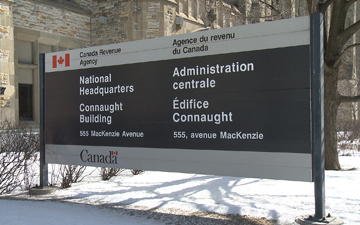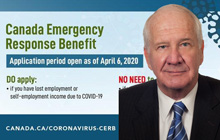Case Commentary: CRA violates procedural fairness for CERB/CRB claims

Canadian tax lawyer and accountant David J Rotfleisch examines the Federal Court decision in Cameron v. Canada (Attorney General) in favour of the taxpayer
Introduction: CERB and CRB claims before the Federal Court
 |
David J Rotfleisch, CPA, JD is the founding tax lawyer of Taxpage.com and Rotfleisch & Samulovitch P.C., a Toronto-based boutique tax law corporate law firm. |
The Canada Revenue Agency has been assessing, and often denying, Canada Emergency Response Benefit and Canada Revenue Benefit claims. Recourse for those individual taxpayers denied CERB and CRB is to request a second review from the CRA. If that review fails to sway the CRA, then the taxpayer may bring their case before the Federal Court by way of judicial review.
One case that ended up before the Federal Court was Cameron v. Canada (Attorney General), where the Canadian tax litigation lawyer for Michael Ian Cameron brought an application for judicial review of the CRA's decision declaring him ineligible for CERB, CRB, and CWLB. The CRA determined his ineligibility based on an alleged failure to demonstrate that he met the required $5,000 employment or net self-employment income threshold. Mr. Cameron alleged that the CRA's decision was unreasonable, citing a lack of proper review and procedural unfairness. The Federal Court agreed with Mr. Cameron and granted the application.
Background: Cameron's CERB/CRB claim
Mr. Cameron, the applicant, is an IT analyst who was self-employed as an IT consultant/sub-contractor in Calgary in 2019. He faced a cessation of work opportunities when the COVID-19 pandemic began in March 2020.
Mr. Cameron applied for CERB, CRB, and CWLB — programs aimed at providing income support to individuals adversely affected by the COVID-19 pandemic. The programs were all administered by the CRA and required an applicant to have earned at least $5,000 from approved income sources in 2019, 2020, or in the 12 months prior to the application date.
Mr. Cameron would receive CRB benefits for 27 two-week periods and CERB benefits for seven four-week periods until October 9, 2021, and September 26, 2020, respectively.
On June 16, 2022, the CRA initiated a review of Mr. Cameron's eligibility and asked for further evidence to support his claims. Mr. Cameron submitted a $20,000 cash receipt from his father for IT services as proof of evidence. The CRA's Benefits Compliance Officer ("CRA's Reviewer") found Cameron ineligible for all three programs.
For CERB and CRB, the CRA's reviewer found that he had not earned at least $5,000 in employment or self-employment income in 2019, 2020, or the 12 months prior to the first application. For the CWLB, he had not earned at least $5,000 and he was not working for reasons considered to be unreasonable or unrelated to a COVID-19 lockdown, nor did he live, work, or provide a service in a COVID-19 lockdown region. The CRA's reviewer stated that the receipt had insufficient details, there was a lack of evidence, and unconfirmed income. This decision was contested by Mr. Cameron and led to a second review.
During the second review, Mr. Cameron alleged that the CRA's reviewer failed to adequately review the evidence, provide reasons for ineligibility, and violated procedural fairness. He asserted that the decision lacked transparency.
Mr. Cameron claimed to have epilepsy, causing seizures and memory problems, for which he requested accommodations from the CRA. Specifically, Mr. Cameron requested to receive written communications and a list of eligibility requirements to accommodate his memory and concentration challenges.
Mr. Cameron escalated his concerns about the reviewer's competence to a CRA supervisor. He expressed doubts about the CRA reviewer's knowledge of his file, leading to discussions about policies and file reassignment. On March 2, 2023, the supervisor committed to exploring Mr. Cameron's requests for accommodation and file reassignment.
On April 14, 2023, the CRA rendered a final decision, maintaining Mr. Cameron's ineligibility. The final decision outlined reasons for ineligibility related to insufficient evidence of professional income and no eligible income for 2020 and 2021.
Main Issue of the Case: Whether the CRA's decision was procedurally fair
There were two key issues brought before the Federal Court. The first was whether the CRA's decision was procedurally fair. The second was whether the CRA's decision was reasonable. After finding that the CRA's decision was not procedurally fair, the Federal Court decided not to explore the question of whether the decision was reasonable.
To decide whether the CRA's decision was procedurally fair, the Federal Court relied on the standard of Correctness. This is a non-deferential standard of review. The central question when applying to for issues of procedural fairness is whether the procedure was fair having regard to all of the circumstances.
If the Federal Court had explored the issue of reasonableness, then the Court would have had to apply the standard of Reasonableness. This would have required the court to determine whether the decision under review, including both its rationale and outcome, is transparent, intelligible and justified.
Mr. Cameron argued that the decision was procedurally unfair, emphasizing that the CRA failed to adequately review the relevant evidence and did not provide reasons for his ineligibility. He also raised concerns about procedural unfairness and violation of his taxpayer rights.
The CRA argued that Mr. Cameron had the opportunity to know the case against him and had the opportunity to respond to it. The CRA stated that Mr. Cameron was asked on numerous occasions to provide documentation to support his claim, was allowed to have an agent speak on his behalf, and to provide additional submissions on his eligibility for the benefits. The CRA submitted that they had offered Mr. Cameron the opportunity to take notes in response to questions he may have, an offer that was rejected. The CRA maintained that Mr. Cameron was in possession of all relevant documents needed for his claim and that the CRA accommodated his requests to speak to a supervisor, and that a different reviewer made the second decision than the initial decisions.
The Federal Court agreed with Mr. Cameron's assertion of procedural unfairness. It noted that Mr. Cameron, due to his epilepsy and related memory issues, had requested accommodations, specifically asking for written communication. This was supported by records of phone calls made by Mr. Cameron and sister-in-law to the CRA requesting accommodations. Thus, the CRA were made explicitly aware of the request.
Nonetheless, the CRA, despite having explicit knowledge of Mr. Cameron's disability, did not provide necessary accommodations. This led to a failure in allowing Mr. Cameron to know the case against him and respond appropriately. The Federal Court found that the CRA failed to provide an opportunity for Mr. Cameron to know his case and respond to it, which was considered by the Court to be a breach of procedural fairness.
The Federal Court also referred to the doctrine of legitimate expectations, stating that the supervisor's clear and unambiguous representations regarding the procedure to be followed were not fulfilled. The Federal Court emphasizes that a breach of legitimate expectations had occurred based on a telephone call between the CRA's Reviewer's supervisor and Mr. Cameron. During the call the supervisor had agreed to explore Mr. Cameron's requests for accommodation and the reassigning of Mr. Cameron's file to another reviewer.
The CRA conceded that the supervisor never followed up on this request. The Federal Court found that the supervisor had made "clear, unambiguous and unqualified" representations that a particular procedure—namely, inquiring into assigning a new agent and the CRA's written accommodation policy—would be followed. Thus, the supervisor's failure to follow up on these commitments amounted to a breach of procedural fairness.
The Federal Court concluded that the decision was procedurally unfair due to the CRA's failure to accommodate Mr. Cameron's disability-related requests and the breach of legitimate expectations. The application for judicial review was thus granted without costs.
David J Rotfleisch, CPA, JD is the founding tax lawyer of Taxpage.com and Rotfleisch & Samulovitch P.C., a Toronto-based boutique tax law corporate law firm and is a Certified Specialist in Taxation Law who has completed the CICA in-depth tax planning course. He appears regularly in print, radio and TV and blogs extensively.
With over 30 years of experience as both a lawyer and chartered professional accountant, he has helped start-up businesses, cryptocurrency traders, resident and non-resident business owners and corporations with their tax planning, with will and estate planning, voluntary disclosures and tax dispute resolution including tax audit representation and tax litigation. Visit www.Taxpage.com and email David at david@taxpage.com.
Read the original article in full on Tax Law Canada. Author photo courtesy Rotfleisch & Samulovitch P.C. Image by iStock.









(0) Comments